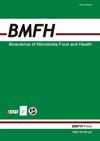High productivity of immunostimulatory membrane vesicles of <i>Limosilactobacillus antri</i> using glycine
IF 2.9
4区 医学
Q2 Agricultural and Biological Sciences
引用次数: 0
Abstract
Nanosized membrane vesicles (MVs) released by bacteria play important roles in both bacteria–bacteria and bacteria–host interactions. Some gram-positive lactic acid bacteria produce MVs exhibiting immunoregulatory activity in the host. We found that both bacterial cells and MVs of Limosilactobacillus antri JCM 15950, isolated from the human stomach mucosa, enhance immunoglobulin A production by murine Peyer’s patch cells. However, the thick cell walls of gram-positive bacteria resulted in low MV production, limiting experiments and applications using MVs. In this study, we evaluated the effects of glycine, which inhibits cell wall synthesis, on the immunostimulatory MV productivity of L. antri. Glycine inhibited bacterial growth while increasing MV production, with 20 g/L glycine increasing MV production approximately 12-fold. Glycine was most effective at increasing MV production when added in the early exponential phase, which indicated that cell division in the presence of glycine increased MV production. Finally, glycine increased MV productivity approximately 16-fold. Furthermore, glycine-induced MVs promoted interleukin-6 production by macrophage-like J774.1 cells, and the immunostimulatory activity was comparable to that of spontaneously produced MVs. Our results indicate that glycine is an effective agent for improving the production of MVs with immunostimulatory activity in gram-positive lactic acid bacteria, which can be applied as mucosal adjuvants and functional foods.抗利乳酸菌免疫刺激膜泡高产率的研究用甘氨酸
细菌释放的纳米膜囊泡(MVs)在细菌-细菌和细菌-宿主相互作用中起着重要的作用。一些革兰氏阳性乳酸菌在宿主体内产生具有免疫调节活性的MVs。我们发现,从人胃粘膜分离得到的嗜酸limmosilactobacillus antri JCM 15950的细菌细胞和MVs均能促进小鼠Peyer 's patch细胞产生免疫球蛋白A。然而,革兰氏阳性菌的细胞壁较厚导致MV产量低,限制了MV的实验和应用。在本研究中,我们评估了抑制细胞壁合成的甘氨酸对胃窦乳杆菌免疫刺激MV产量的影响。甘氨酸抑制细菌生长,同时增加MV产量,20 g/L甘氨酸使MV产量增加约12倍。在指数期早期添加甘氨酸对增加MV产量最有效,这表明在甘氨酸存在下的细胞分裂增加了MV产量。最后,甘氨酸将MV生产率提高了约16倍。此外,甘氨酸诱导的mv促进巨噬细胞样J774.1细胞产生白细胞介素-6,其免疫刺激活性与自发产生的mv相当。结果表明,甘氨酸是促进革兰氏阳性乳酸菌产生具有免疫刺激活性的MVs的有效剂,可作为粘膜佐剂和功能性食品。
本文章由计算机程序翻译,如有差异,请以英文原文为准。
求助全文
约1分钟内获得全文
求助全文
来源期刊

Bioscience of Microbiota, Food and Health
Immunology and Microbiology-Applied Microbiology and Biotechnology
CiteScore
5.50
自引率
3.20%
发文量
24
期刊介绍:
Bioscience of Microbiota, Food and Health (BMFH) is a peer-reviewed scientific journal with a specific area of focus: intestinal microbiota of human and animals, lactic acid bacteria (LAB) and food immunology and food function. BMFH contains Full papers, Notes, Reviews and Letters to the editor in all areas dealing with intestinal microbiota, LAB and food immunology and food function. BMFH takes a multidisciplinary approach and focuses on a broad spectrum of issues.
 求助内容:
求助内容: 应助结果提醒方式:
应助结果提醒方式:


